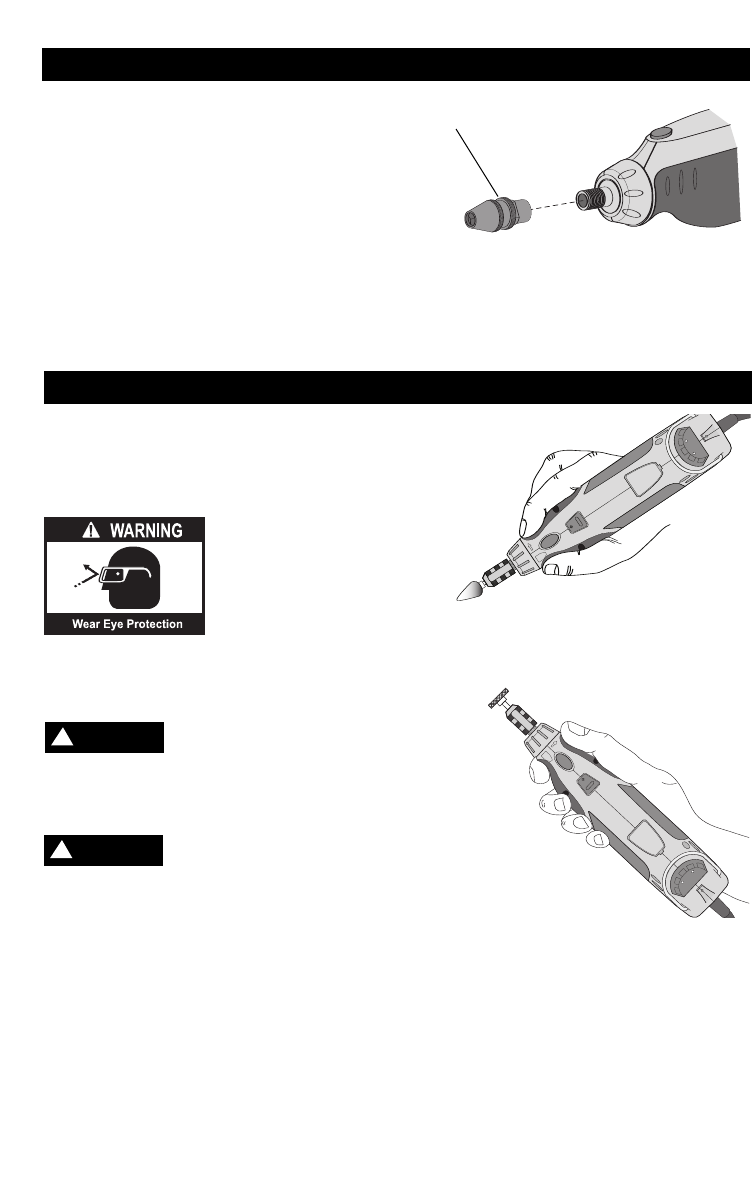
9
ASSEMBLY (CONTINUED)
OPERATING INSTRUCTIONS
Learning To Use the Rotary Tool
Getting the most out of your rotary tool is a
matter of learning how to let the speed and
the feel of the tool in your hands work for
you.
The first step in
learning to use the
rotary tool is to get
the “feel” of it. Hold it
in your hand and feel
its weight and
balance. Feel the
taper of the housing. This taper permits the
tool to be grasped much like a pen or pencil.
The unique comfort grip on the nose allows
for added comfort and control during use.
Always hold the tool
away from your face.
Accessories can be damaged during
handling and can fly apart as they come
up to speed. This is not common, but it
does happen.
When holding tool, do not
cover the air vents with
your hand. Blocking the air vents could
cause the motor to overheat.
IMPORTANT!
Practice on scrap material
first to see how the tool’s high-speed action
performs. Keep in mind that your rotary tool
will perform best by allowing the speed,
along with the correct Craftsman accessory
and attachment, do the work for you. Do not
put pressure on the tool during use, if
possible.
Instead, lower the spinning accessory lightly
to the work surface and allow it to touch the
point at which you want to begin.
Concentrate on guiding the tool over the
WARNING
!
CAUTION
!
work using very little pressure from your
hand. Allow the accessory to do the work.
Usually it is better to make a series of
passes with the tool rather than to do the
entire job with one pass. A gentle touch
gives the best control and reduces the
chance for error.
2
4
2
4
For best control in close work, grip the rotary
tool like a pencil between your thumb and
forefinger.
The “golf” grip method is used for more
aggressive operations such as grinding or
cutting.
Keyless Chuck
The keyless chuck is used in place of the
standard collet and collet nut to easily and
quickly remove and install some accessories.
The keyless chuck holds various accessories
with shank sizes 1/32" to 1/8" and is intended
for light duty accessories such as drill bits,
sanding drums, polishing accessories, wire
and bristle brushes and cut-off wheels.
1. See steps 1—3, Changing Collets on
page 8 to install the keyless chuck.
2. Thread the keyless chuck onto the rotary
tool shank.
Keyless Chuck
3. Use the supplied wrench to completely
tighten the keyless chuck if you are
unable to apply sufficient tightening
pressure to hold the bit or accessory.


















